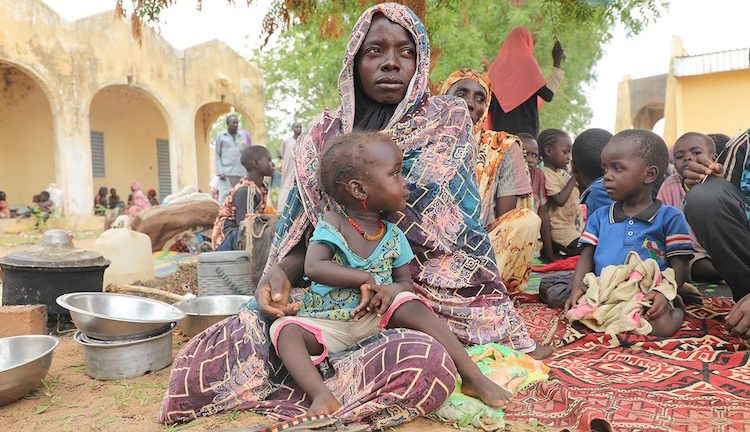By Caroline Mwanga
NEW YORK | 14 April 2024 (IDN) — One year after war erupted between the Sudanese Armed Forces (SAF) and the Rapid Support Forces (RSF) on 15 April 2023, Sudan is facing one of the fastest unfolding crises globally, with unprecedented needs. About 25 million people—of whom over 14 million are children—need humanitarian assistance and support.
According to the United Nations Office for the Coordination of Humanitarian Affairs (OCHA), 17.7 million people—more than one-third of the country’s population—are facing acute food insecurity (IPC3+) under a warning of potential famine issued by FEWS NET and underwritten by the Global IPC Group. Of these, 4.9 million people are on the brink of famine. More than 8.6 million people—about 16 per cent of the total population of the country—have fled their homes since the conflict started. They have sought refuge within Sudan or in neighbouring countries, making Sudan the largest displacement crisis in the world.
Livelihoods decimated
The conflict is devastating the livelihoods of millions of people in Sudan. The International Monetary Fund (IMF) projects that Sudan’s real Gross Domestic Product (GDP) is likely to reduce by 18.3 per cent in 2024. According to the World Bank, the economy contracted by 12 per cent in 2023 as the conflict has halted production and destroyed human capital and state capacity.
Moreover, the armed conflict has damaged the country’s industrial base, education, and health facilities. It has also led to a collapse in economic activity including commerce, financial, and information and communications technology services—and the erosion of state capacity, with detrimental impacts on food security and forced displacement. For comparison, the economies of Yemen and Syria have shrunk by about 50 per cent over the past decade, or about 5 per cent per year on average. The pace of economic contraction in Sudan is on pace to more than double that decline.
About 8.1 million people have received lifesaving assistance since April
Despite various challenges—insecurity, looting, high levels of bureaucratic impediments, poor network and phone connectivity problems, lack of cash, and few technical and humanitarian staff on the ground—affecting the delivery of humanitarian assistance in many parts of the country, humanitarian organizations reached about 8.1 million people with multi-cluster life-saving assistance and 5.7 million people with agriculture and livelihood support between 15 April and 31 December 2023.
Mutual support and locally led aid efforts by volunteers have been instrumental in supporting people, particularly for those trapped in conflict or hard to reach areas. Prior to the conflict, 2.7 million people were reached with some form of humanitarian assistance from January to March 2023. This includes vital education, health, food, nutrition, water assistance and protection services.
More funding needed to reach more people
The 2024 Sudan Humanitarian Needs and Response Plan (HNRP) is seeking US$2.7 billion from donors to provide life-saving multi-cluster and protection assistance to 14.7 million people in desperate need through the end of 2024. According to the Financial Tracking Service, the 2024 HNRP was only 5.8 per cent funded, with $155 million received as of 14 April 2024. In 2024, the 167 UN and NGO partners in Sudan can provide more people with assistance and services if the funding for humanitarian response is expanded with an emphasis on funding early in the year.
Suffering for Sudanese women and girls
Against this backdrop, UN Women has urged the international community to ensure that the conflict in Sudan does not become a neglected crisis. The United Nations entity dedicated to gender equality has furthermore called for immediate steps to ensure the protection of women and girls, support their economic empowerment, and include them in peace negotiations and decision-making. “We urge international partners and donors to invest in local, women-led organizations and prioritize resources to address the gender dimensions of this crisis.”
UN Women has warned that the current conflict is having a devastating impact on the people of Sudan, particularly women and girls. The conflict has reversed the gains made toward democracy and stability, leaving the country in suffering and insecurity, while facing a catastrophic humanitarian crisis.
UN Women said that Sudanese women and girls are paying a heavy price for this violence, bearing the brunt of a humanitarian crisis that remains largely invisible to the world. Sudan is among the largest internal displacement crises in the world. 53 per cent of internally displaced are women and girls, and there is a growing risk that the violence will soon create the world’s largest hunger crisis. More than 7,000 new mothers could die in the coming months if their nutritional and health needs remain unmet.
According to UN Women, over 6.7 million people are at risk of gender-based violence and reports of intimate partner violence, sexual exploitation and abuse, and trafficking in persons are widespread and increasing. Survivors report rarely able to access services or report to authorities. The economic impact of the conflict has further marginalized women, stripping them of livelihood opportunities and pushing many towards extreme measures and the risk of sexual exploitation and abuse as they seek to support their families.
Besides, women and girls are not only victims of this violence but also pivotal to the survival and resilience of their communities. UN Women salutes the courage and bravery of Sudanese women and women’s rights organizations, who continue to advocate for peace and a return to democratic governance at different fora. Their participation in peace processes and humanitarian responses is not just beneficial but necessary for creating lasting peace and security. [IDN-InDepthNews]
Photo: Mariam Djimé Adam, a refugee from Sudan with eight children, is seen in the yard of a secondary school in the neighbouring country of Sudan. Photo: UNICEF/Annadjib Ramadane Mahamat
IDN is the flagship agency of the Non-profit International Press Syndicate


